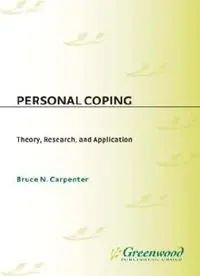Table Of ContentPersonal Coping
This page intentionally left blank
PERSONAL COPING
Theory, Research, and
Application
EDITED BY
Bruce N. Carpenter
Westport, Connecticut
PRAEGER London
Library of Congress Cataloging-in-Publication Data
Personal coping : theory, research, and application / edited by Bruce
N. Carpenter.
p. cm.
Includes bibliographical references and indexes.
ISBN 0-275-93012-2 (alk. paper)
1. Adjustment (Psychology) 2. Stress (Psychology) I. Carpenter,
Bruce N.
BF335.P48 1992
15.2'4-<lc20 92-8378
British Library Cataloguing in Publication Data is available.
Copyright © 1992 by Bruce N. Carpenter
All rights reserved. No portion of this book may
be reproduced, by any process or technique, without
the express written consent of the publisher.
Library of Congress Catalog Card Number: 92-8378
ISBN: 0-275-93012-2
First published in 1992
Praeger Publishers, 88 Post Road West, Westport, CT 06881
An imprint of Greenwood Publishing Group, Inc.
Printed in the United States of America
The paper used in this book complies with the
Permanent Paper Standard issued by the National
Information Standards Organization (Z39.48-1984).
P
In order to keep this title in print and available to the academic community, this edition
was produced using digital reprint technology in a relatively short print run. This would
not have been attainable using traditional methods. Although the cover has been changed
from its original appearance, the text remains the same and all materials and methods
used still conform to the highest book-making standards.
Contents
PREFACE Vl
1. Issues and Advances in Coping Research
Bruce N. Carpenter 1
2. Conceptual and Methodological Issues in Current Coping
Assessments
Arthur A. Stone, Eileen Kennedy-Moore, Michelle G.
Newman, Melanie Greenberg, and John M. Neale 15
3. Making the Case for Coping
Susan Folkman 31
4. Coping with Psychosocial Stress: A Developmental
Perspective
Bruce E. Compas, Vanessa L. Malcarne, and
Gerard A. Banez 47
5. Situational Determinants of Coping
Robert R. McCrae 65
6. Individual Differences in the Coping Process: What to Know
and When to Know It
Suzane M. Miler 1
1. Interpersonal Aspects of Coping
Bruce N. Carpenter and Susan M. Scot 93
vi Contents
8. Perceived Control, Personal Effectiveness, and Emotional
States
Herbert M. Lefcourt 1
9. Temporal Factors in Stress and Coping: Intervention
Implications
Stephen M. Auerbach 133
10. Life Crises and Personal Growth
Jeane A. Schaefer and Rudolf H. Mos 149
11. Outcome Expectancies and Psychosomatic Consequences
Holger Ursin and Karsten Hyten 171
12. Religious Beliefs and Practices and the Coping Process
Crystal Park and Lawrence H. Cohen 185
13. A Theory of Family Competence and Coping
Luciano V Abate 19
BIBLIOGRAPHY 219
NAME INDEX 253
SUBJECT INDEX 263
ABOUT THE CONTRIBUTORS 267
Preface
A natural outgrowth of attention to stress issues over the past two decades has
been a tremendous increase in the research on coping. Although mental health
practitioners have necessarily dealt with coping for many years, the development
of coping models is mostly a recent phenomenon. The recognition that coping
is not simply a reflection of pathology has led researchers to study the area apart
from the traditional models of psychopathology, yielding clearer and more pow-
erful models. Thus, many persons are interested in updating their knowledge of
this area to reflect this shift. Also, the large volume of research now being
conducted in this area is scattered across many topical areas, making it difficult
for the average reader to find the common themes and perceive the structure. It
is hoped that the essays contained in this volume will serve these needs.
Because coping necessarily implies a problem, much of the writing in the area
has been integrated with concepts of stress. A large proportion of the research
on coping, then, describes coping with a given life problem or stressor. This
has been a useful approach and has clarified some of the dynamics of those
particular situations. However, three relevant points have become increasingly
evident: (1) the variety of stressors is extremely large, making a comprehensive
examination of stressful situations unwieldly; (2) the obvious and usual ways of
distinguishing stressors (e.g., marriage, divorce, and death of spouse) are often
not along the dimensions that have implications for coping; and (3) a number
of coping process models appear to have relevance across many situations. It
seems appropriate, therefore, to focus on features of coping which have broad
relevance, applying to many situations.
As will become evident, many contributors to the coping literature have
adopted the process model proposed by Lazarus and Folkman in their landmark
1984 book, States, Appraisal, and Coping. However, as characterized by the
Preface
vm
chapters in this volume, not all find it necessary to refer to such a model; some
openly disagree with elements of that approach, and problems in studying coping
from such a perspective are emerging. Several aspects of this controversy are
highlighted in the following chapters. Such treatments will be useful to those
conducting research on coping or designing intervention programs.
For the most part, each chapter focuses on some limited aspect of coping,
examining the dynamics of that component and its relevance to the whole process.
Topics are wide-ranging, from how coping with extreme stressors can contribute
positively to personal growth, to the role of personal control, to situational
influences on coping. In total the chapters provide an overview of major principles
of coping and description of important, emerging trends.
Personal Coping

